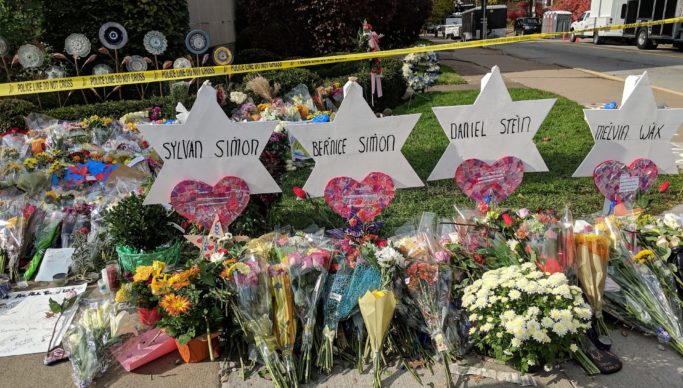
Death Sentence of Pittsburgh Shooter Met with Relief, Prayers and a Wish for Closure
- By Lew Morningstar --
- 07 Aug 2023 --
Nearly five years after the deadliest antisemitic attack in the nation’s history, the individual found guilty has been sentenced to death.
For the survivors, their friends, families and neighbors the dominant reaction was thankfulness—not so much for the sentencing, but for the hope that the community’s ordeal was finally over.
Jeffrey Myers, the rabbi of the Tree of Life congregation, which was housed in the synagogue the gunman attacked, opened a press conference at the Jewish community center in the Squirrel Hill neighborhood with a prayer of thanksgiving.
Dozens of family members and survivors of the attack joined him as he recited the Hebrew prayer generally chanted at the beginning of a Jewish holiday, celebrating the divinity that has enabled the worshippers to survive to this point. The prayer, the Rabbi said, thanks God, “who has kept us alive, sustained us and enabled us to reach this stage.”
There was palpable relief.
Rabbi Myers noted that the day of the sentencing was on the Hebrew date of Tu B’Av, a day traditionally marking courtship and love. Drawing a parallel between the date and the years-long “embrace” bestowed on the Jewish community by first responders, neighbors, and the community at large for nurturing the survivors and being ready to help on a moment’s notice.
“I don’t believe in coincidences. It was meant to be today,” he said. “Why today? Because today we received an immense embrace from the halls of justice around all of us, to say that our government does not condone antisemitism in the vile form that we witnessed, and that we were embraced by a system that supported and nurtured us and upheld us.”
Several survivors also spoke at the press conference, some applauding the capital sentencing, some hoping that the severity of the sentence will show others that antisemitism will not be tolerated; and all expressing gratitude to the community.
An outcome of the tragedy is that the three congregations sharing the Tree of Life synagogue, albeit of different denominations of Judaism, were drawn closer. A minority of those involved objected to the death penalty—the Bible calls for death for no less than 36 offenses, including murder, kidnapping, adultery, incest, rape, disrespecting parents and Sabbath desecration; but later Rabbis argued that death should only be decreed in extreme cases not to exceed once in seventy years. Despite their differences all three congregations expressed a feeling of solidarity.
“[E]ven though the community is not is not of one mind, we don’t have one universal opinion, we are united in supporting each other,” said David Harris, a professor at the University of Pittsburgh law school. “We are united in wanting this horrible thing to go right and be over and to say we did our best to support those who have been injured.”
The shooter will join 41 others on death row and still could conceivably appeal the sentence all the way to the Supreme Court. Decades could pass before a final reckoning is made.
Audrey Glickman, who hid in the synagogue during the massacre said, “Even if he sits alive on death row for decades, he is separated from others. Had he been sentenced to life in prison … he would have been afforded an increasing ability to communicate and play with others and the chance of working his way out of any high-security situation. This has been a step in the right direction.”
Since the reinstitution of capital punishment in 1988, just 16 individuals have been executed by the federal government.
The gunman, who reportedly told law enforcement—after killing 11 people in cold blood—that “Jews are the children of Satan” and that “all these Jews needed to die,” is the first person sentenced to death in over two years. The local Jewish federation released this statement: “As this chapter comes to a close, we reflect on the strength and resilience of Pittsburgh’s Jewish community and the entire community. In the wake of the horrors of the worst antisemitic attack in U.S. history, our community neither retreated from participating in Jewish life nor suppressed our Jewishness. Instead, our community embraced our Jewish values — strengthening Jewish life, supporting those in need, and building a safer, more inclusive world.”


















